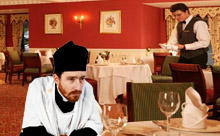

Argument VI
Redefining Sacrilege


At one point in his letter Mr. George took issue with some of the conclusions presented by Dennis Fischer in a split sermon given at the time of A Sabbath Test’s release. In his message Mr. Fischer characterized dining out on the Sabbath as a picture of captivity.
Mr. George was furious with such a view, for obvious reasons. So adamant was his protest that he offered what we believe is a stunning assessment of this day. He actually referred to dining out on the Sabbath as a "GIFT" from God to His people today. If we had not read this with our own eyes, we would NEVER have believed anyone would suggest such a thing. Later Mr. George called dining out on the Sabbath "one tool for better keeping it [the Sabbath]."
Mr. George:
Eating out [on the Sabbath] is God's gift to us for Sabbath-keeping in the current distress. How awful for you to call this blessed, beneficial, God-bestowed privilege for the appreciation of His holy Sabbath a "symbol of slavery and captivity!" May God have mercy on you and lead you to sounder thinking.
Our Response:
For Mr. George to call dining out on the Sabbath a "gift" and a “God-bestowed privilege” is audacious to say the least. It is no such thing. With these words he is preaching the same bondage God’s word condemns. Is Mr. Fischer “awful” for his characterization of Mr. George’s Sabbath dining practices? We don’t think so.
The scriptures reveal that just as the children of Israel were enslaved in Egypt until God miraculously delivered them, those whom He has called in this present age were also once enslaved in spiritual Egypt. God’s people today were once in bondage—the same bondage those who work every Sabbath in a restaurant are in. Whether Mr. George believes it or not, everything about the restaurants he patronizes on God’s Sabbath is drenched in slavery. Furthermore, every member of God’s true Church should understand this truth because we were all once in that slavery ourselves.
With this in mind, God’s people must understand that our Great Deliverer would no more permit His people today to return to this world and its sin than He would permit the Israelites of yesterday to return to Egypt and their sin. As much as Mr. George wants to go back to Egypt, God forbids it and warns of its consequences. Notice what He says.
And I heard another voice from heaven, saying, Come out of her, My people, that you be not partakers of her sins, and that you receive not of her plagues. (Rev. 18:4)
Consider these words in the context of dining out on the Sabbath. In order to engage in this practice, God’s people must return to a world that does not know Him. In the Old Testament that world was called Egypt. In the New Testament it is called Babylon. But make no mistake about it, these worlds are one and the same.
Come Out of Egypt
When God commanded His people to cease from working on the Sabbath and to not compel others to work on their behalf, He was making a powerful statement. He was commanding His people to COME OUT OF EGYPT, to COME OUT OF BABYLON! In other words, God’s people are not to be a part of the very sin that once gripped their lives.
Mr. George continued:
Your attack on moderation and balance is founded on the faulty assumption that eating in restaurants is evading and breaking the Sabbath law, rather than one tool for better keeping it. Without the faulty foundation, the argument collapses.
Our Response:
Earlier Mr. George referred to dining out on the Sabbath as “God’s gift” to His people. Now he refers to it as a “tool for better keeping the Sabbath holy.” Understand what Mr. George is advocating here. He asserts that going out into a worldly business where God's Sabbath is being desecrated, and purchasing the fruits of this sin is a "tool" for worshipping the true God.
Quite frankly we are stunned that he would offer such an assessment of this practice. This argument is not the result of “critical analysis” as he claims. On the contrary, it is nothing short of a desperate attempt to rehabilitate SIN. It is human reasoning run amuck. In it he actually calls the profane, holy. And although he said “May God have mercy on you and lead you to sounder thinking,” we think it is Mr. George that needs to consider God’s admonition here.
Woe unto them that call evil good, and good evil; that put darkness for light, and light for darkness; that put bitter for sweet, and sweet for bitter! (Isa. 5:20)
Argument VII